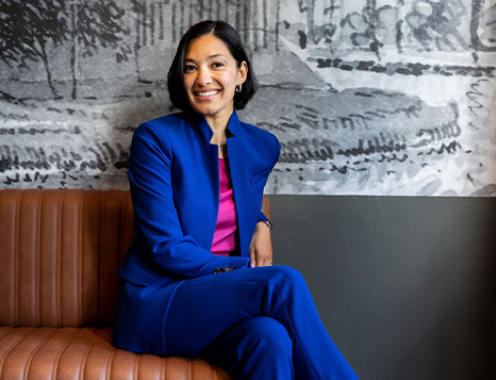Maryana Reurings-Tsiganko - E2E Process Transformation Program Director at Pharming Group


Maryana Reurings-Tsiganko is the E2E Process Transformation Program Director at Pharming Group N.V., a global biopharmaceutical company specializing in rare and life-threatening diseases.
Speaking with Thomas Powell, Maryana offers a brief insight into Pharming’s culture and the nature of the industry. She further discusses her management approach and ethical leadership style, while also sharing standout characteristics and advice for aspiring leaders.
What’s the most rewarding part of your role at Pharming Group?
For me, the most rewarding part about working at Pharming, and within the rare diseases industry, is knowing you are doing things for a larger cause, and knowing your work is valued and appreciated by patients daily.
I have an opportunity to work with many passionate people who feel the same way and share the same mission and vision. The people are willing to go beyond their responsibilities and help their teams because they see that greater purpose. What I like the most is having an opportunity to work with a very diverse group of people that you can learn a lot from which stimulates good conversations.
Additionally, the nature of the industry requires the company to be agile and accommodating, allowing me to work in a challenging environment, and brainstorm ideas and solutions daily.
What is the most memorable moment from your career?
If I were to reflect on recent times, the answer is joining Pharming. Previously, I had never worked for a biopharmaceutical company. I’d also never worked for a small-sized company, nor developed and established a department from scratch – these were new challenges.
I came to build a department from the ground up, requiring many different skillsets. For example, I utilized stakeholder management more, especially for non-executive and executive board members. I also had to invest more time in change management, communicating with people, taking them along the journey, showing them the value, and getting their buy-in. For me, it was rewarding to see and have people listen.
Another challenge I encountered was the culture change. I think sometimes people underestimate that the cultural aspects play a huge role. Coming from the USA, I had to learn to understand differences in approaches and communication - what works and doesn’t work – really opened my eyes to the best way to build the department and ensure people understood what I was trying to achieve and join my side.
I also learned I had to be more patient, which helped me grow personally and professionally. In the past, I was a go-getter and very to the point. Now, I really take the time to understand and listen.
How do you develop individuals who can manage daily operations while also thinking strategically about processes, the bigger picture, and their careers?
The key to managing any team is establishing trust and understanding.
You need to be able to create a safe environment. So, when managing teams, especially across borders, you need to invest time into understanding their culture, along with their preferred way of communication and how they like to manage and want to be managed. Be flexible in your approach and be willing to accommodate different preferences in communication, as every team member will have differing preferences; there’s no one way to approach leadership or management.
Listening is the most important element. Listen to understand your team’s wants and needs. At the end of the day, it is about having meaningful conversations, building relationships, and establishing trust. Also, creating the right balance between ensuring the team can work on things they are comfortable with and mastering new things to challenge them.
Furthermore, give the team space to be creative. They can experiment and have that strategic thinking and creativity, but you should be there to support them and have their back.
I would add that you should ask your team the right questions to help them realize their dreams. Understand what they need from development and support standpoints. Pick up on seeing their potential; sometimes people don’t realize they have certain qualities or potential, and I think it is the responsibility of a manager/leader to help them see that.
If you could go back and give your younger self some advice, what would it be?
The piece of advice I’d offer is to be patient and not expect success overnight. It is a combination of persistence, hard work, and a bit of luck, as being in the right place at the right time helps.
Realize it is okay to take your time, and it’s okay that you don’t have to know everything. You’re allowed to question your direction and path, and you don’t need all the answers. It’s a journey; it’s okay to be lost sometimes.
Drawing on your journey, what advice would you give to aspiring leaders?
Be authentic - that’s number one. Always stay true to yourself. It takes courage to look at yourself critically and be honest with yourself, what you can achieve, and how you can support the organization or team.
Continuously balance confidence with humility; you don’t want to be arrogant. However, your team needs to see your confidence in where you are going, where you are, and the vision.
Sometimes, we underestimate the element of empathy, too. People are more willing to listen and work with you if you show them that you care and understand their challenges and struggles. And you should be there to support them and have their back.
What type of leadership style inspires you?
Ethical leadership inspires me, characterized by a strong moral compass, commitment, and doing what is right – something I stand for. Ethical leaders demonstrate integrity, honesty, and transparency, which speaks to me. If I see that in other leaders, they’ve already won me over as I greatly appreciate those qualities.
I always ask myself, “What is the right thing to do?” That guides me through my day and career. You cannot go wrong if you ask that question.
Ethical leaders also tend to lead by example. What I have seen work within my teams is if I tell them to do something or if I stand for something, I demonstrate it first. Actions speak louder than words, so that helps to deliver the message. Hence, it plays a critical role in setting a trustworthy culture and an environment where people feel valued and driven.
What’s next in your career journey?
I like to take risks, and I like challenges. I try to push myself outside my comfort zone as much as possible. So, the next step would be no different. I would be looking for something that triggers curiosity, excitement, and a little bit of fear; either doing a different type of work in the same industry or the same work in a different industry, which can be equally challenging.
I really enjoy managing teams and developing people, giving them confidence, guiding them, and helping them achieve their dreams gives me happiness. Managing larger teams would be my preference.
In the long term, becoming part of an executive or non-executive board in an organization, where I can have more impact, drive strategic decisions, see those materialized, and help organizations develop and grow. Just like with people, I like having an impact and seeing results.
What is your favorite quote and why?
The quote, “Determination and perseverance move the world; thinking that others will do it for you is a sure way to fail,” resonates with me as it's how I live my life. I don’t take life for granted and I do not expect things to be handed to me.
I believe you can achieve anything you put your mind to. I apply that in my career and personal life, and it has never disappointed me. Willpower is the most critical asset you can have. If I really want something, I will get it.
What was the last thing that made you smile?
My almost two-year-old boy. It’s important not to forget about our personal lives, and he really puts a huge smile on my face.
Sometimes I am envious of certain childhood behaviors; kids are blissfully happy. Sometimes when you reach adulthood you forget about remaining positive. He brings that back to me, gives me that happiness, and reminds me to look at life through a different lens – it doesn’t always have to be so serious.
Thank you to Maryana for speaking to Thomas Powell, Consultant in our Finance & Accountancy recruitment division in the Netherlands.
Views and opinions contained within our Executive Interviews are those of the interviewee and not views shared by EMEA Recruitment.






You can also use your social account to sign in. First you need to:
Accept Terms & Conditions And Privacy Policy